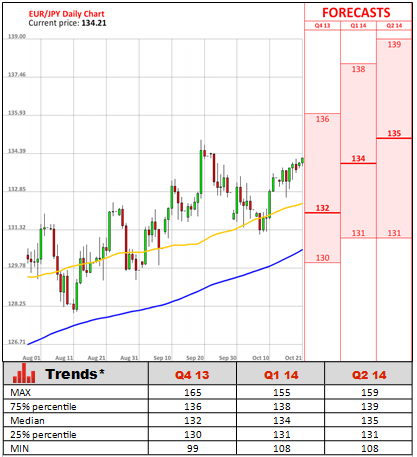As it was widely expected Standard & Poor's Ratings Services affirmed Japan's sovereign credit rating, citing strong and purposeful political leaders as well as improved external position. Both long- and short-term unsolicited rating for the world's largest economy remained unchanged at ‘AA-‘ and ‘A-1+' consequently. The rating agency mentioned Japan's extremely strong external position, diversified and prosperous economy as well as stable financial system, which outweigh weak fiscal position, persistent deflation and aging population. Furthermore, the agency considers current government as a strong advantage as Shinzo Abe's administration during the first nine months has already improved country's near-term economic outlook. Meanwhile, higher expectations are adding more pressure on Abe's three arrow policy also known as Abenomics, and in case they do not deliver the structural reforms needed to achieve a long-term sustain recovery, the agency could lower its rating. S&P also pointed out Japan still remains the world's largest net external creditor. The company expect net external assets to reach 290% of current account receipts by the end of this year. One of the main concerns remains Shinzo Abe's fiscal plans. Though he announced a consumption tax hike and prepared an extra stimulus in case the recovery will derail, the overall approach toward fiscal consolidation remains unclear as they do not mention any specific measures beyond the sales tax increase.
Note: This section contains information in English only.
As it was widely expected Standard & Poor's Ratings Services affirmed Japan's sovereign credit rating, citing strong and purposeful political leaders as well as improved external position. Both long- and short-term unsolicited rating for the world's largest economy remained unchanged at ‘AA-‘ and ‘A-1+' consequently. The rating agency mentioned Japan's extremely strong external position, diversified and prosperous economy as well as stable financial system, which outweigh weak fiscal position, persistent deflation and aging population. Furthermore, the agency considers current government as a strong advantage as Shinzo Abe's administration during the first nine months has already improved country's near-term economic outlook. Meanwhile, higher expectations are adding more pressure on Abe's three arrow policy also known as Abenomics, and in case they do not deliver the structural reforms needed to achieve a long-term sustain recovery, the agency could lower its rating. S&P also pointed out Japan still remains the world's largest net external creditor. The company expect net external assets to reach 290% of current account receipts by the end of this year. One of the main concerns remains Shinzo Abe's fiscal plans. Though he announced a consumption tax hike and prepared an extra stimulus in case the recovery will derail, the overall approach toward fiscal consolidation remains unclear as they do not mention any specific measures beyond the sales tax increase.

Mon, 21 Oct 2013 08:40:36 GMT
Source: Dukascopy Bank SA
"We would lower the ratings if we perceive that the Abe administration's third arrow of its program does not deliver the reforms needed to revitalize the economy"
- Standard & Poor's Ratings Services
As it was widely expected Standard & Poor's Ratings Services affirmed Japan's sovereign credit rating, citing strong and purposeful political leaders as well as improved external position. Both long- and short-term unsolicited rating for the world's largest economy remained unchanged at ‘AA-‘ and ‘A-1+' consequently. The rating agency mentioned Japan's extremely strong external position, diversified and prosperous economy as well as stable financial system, which outweigh weak fiscal position, persistent deflation and aging population. Furthermore, the agency considers current government as a strong advantage as Shinzo Abe's administration during the first nine months has already improved country's near-term economic outlook. Meanwhile, higher expectations are adding more pressure on Abe's three arrow policy also known as Abenomics, and in case they do not deliver the structural reforms needed to achieve a long-term sustain recovery, the agency could lower its rating. S&P also pointed out Japan still remains the world's largest net external creditor. The company expect net external assets to reach 290% of current account receipts by the end of this year. One of the main concerns remains Shinzo Abe's fiscal plans. Though he announced a consumption tax hike and prepared an extra stimulus in case the recovery will derail, the overall approach toward fiscal consolidation remains unclear as they do not mention any specific measures beyond the sales tax increase.
© Dukascopy Bank SA
Actual Topics
Subscribe to "Fundamental Analysis" feed
Подписаться
Чтобы узнать больше о торговой платформе Forex/CFD, SWFX и получить другую информацию, связанную с торговлей,
пожалуйста, звоните нам или запросите обратный звонок.
пожалуйста, звоните нам или запросите обратный звонок.
Для получения дополнительной информации относительно сотрудничества,
пожалуйста, позвоните нам или запросите обратный звонок.
пожалуйста, позвоните нам или запросите обратный звонок.
Чтобы узнать больше о торговых платформах (Forex / Бинарные опционы) от Dukascopy Bank, торговой площадке SWFX или получить другую информацию, связанную с торговлей,
пожалуйста, позвоните нам или запросите обратный звонок.
пожалуйста, позвоните нам или запросите обратный звонок.
Чтобы узнать больше о торговой платформе Forex/CFD, SWFX и получить другую информацию, связанную с торговлей,
пожалуйста, звоните нам или запросите обратный звонок.
пожалуйста, звоните нам или запросите обратный звонок.
Чтобы узнать больше о Крипто / CFD / Forex торговых платформах, SWFX и получить другую информацию, связанную с торговлей,
пожалуйста, позвоните нам или запросите обратный звонок.
пожалуйста, позвоните нам или запросите обратный звонок.
Чтобы узнать больше о Представляющих агентах и получить другую информацию, связанную с торговлей,
пожалуйста, позвоните нам или запросите обратный звонок.
пожалуйста, позвоните нам или запросите обратный звонок.
Для получения дополнительной информации относительно сотрудничества,
пожалуйста, позвоните нам или запросите обратный звонок.
пожалуйста, позвоните нам или запросите обратный звонок.